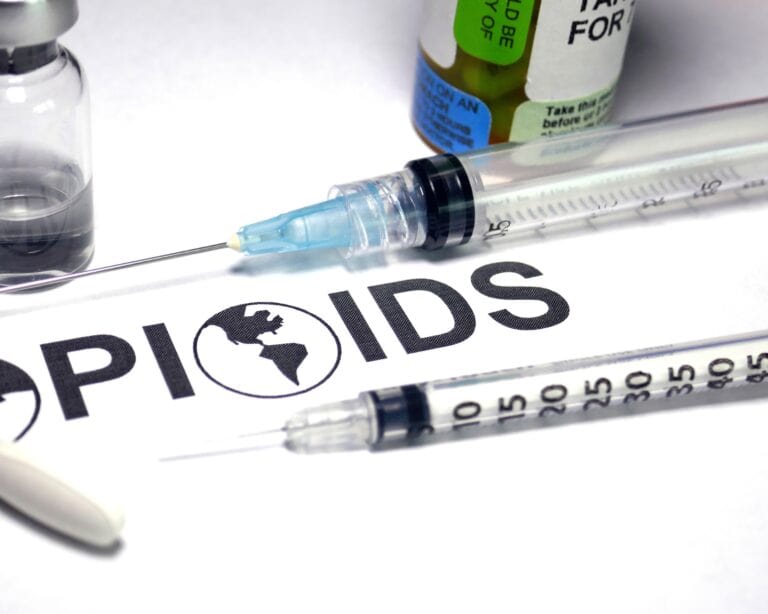The terms opioids and opiates are often used interchangeably to refer to prescription pain-relieving drugs or narcotics. So is there actually a difference between the two? Opioids and opiates, although similar in function, include different drugs and have varying uses. Understanding the properties of both classifications of drugs is important as they are highly addictive drugs. Knowing how they work allows people to be aware of addiction risks as well as identify if they are abusing these drugs.
What are Opioids?
Opioids include all classes of opioid pain relief drugs. This includes natural opioids such as heroin, morphine, and codeine.[1] It also includes synthetic or semisynthetic opioids, meaning those that are manufactured in a lab. Examples of synthetic and semisynthetic opioids include:
- Fentanyl
- Methadone
Fentanyl and methadone are both approved for medical use in the United States, but there are labs across the country that produce them illegally.[2] When these drugs are administered in a medical setting, they are entirely synthetic. Ones produced illegally and sold on the streets are sometimes entirely synthetic and other times include synthetics or additives as well as natural opioids.
Synthetic opioids are more potent than their natural counterparts. They produce intense feelings of euphoria and relaxation in addition to the intended medical use of pain relief.[3] This higher potency increases the risk of accidental overdose and death. The opioid drugs that are produced and sold illegally are especially dangerous. This is because there is no quality control in the illegal labs, meaning other harmful substances are often found in those opioids.[2]
What are Opiates?
Opiates only include naturally occurring opioid drugs. This includes:
- Heroin
- Morphine
- Codeine
Natural opiates are a product of opium poppy flowers. The seeds of these flowers are used to extract opium, which is then manufactured into heroin, morphine, or codeine.[3] The terms “opiate” and “opioid” are used interchangeably only when referring to these naturally sourced drugs.[1]
Although these forms of opioids are less potent than their synthetic counterparts, they are still highly addictive. Opiates produce the same feelings of euphoria and overall well-being as all other opioids do.[3]
Is the Difference Between Opioids and Opiates Important?
There are no real important differentiating characteristics between opiates and opioids, as opiates are also included under the term, “opioid.” Both opiates and opioids act on the same part of the brain by blocking opiate receptors to reduce pain and produce feel-good sensations. The primary difference lies in whether or not these drugs are natural vs. synthetic, and, sometimes, that determines their potency.
Synthetic and semi-synthetic opioids are stronger than naturally produced opiates. This means that less of the drug is needed to produce the desired effect. However, this is incredibly dangerous where someone is abusing these drugs as they can accidentally overdose by taking too much of it. For example, fentanyl, a synthetic opioid, is thought to be 50 times stronger than heroin, a naturally occurring opiate.[2]

Get The Care You Need and Deserve
Woburn Addiction Treatment is a leader in the addiction treatment field, with proven success in facilitating long-term recovery. Our team of top clinical & medical experts specializes in treating addiction coupled with mental illness, ensuring that each person receives individualized care. Call us – we’re available 24/day, 7 days/week.
Risk of Overdose with Synthetic Opioids
Accidental overdoses on synthetic opioids are an increasing problem in the United States. People buying drugs illegally on the streets do not always know what they are getting. Sometimes they think the drug is heroin, when in fact it is the much stronger fentanyl. They take the same amount of fentanyl as they would have heroin resulting in accidental overdose.[2]
Signs of Opioid and Opiate Addiction
There are signs that indicate if a person has developed an opioid addiction. Addiction occurs when a person takes these drugs on a regular basis for extended periods of time. Eventually, the body and brain get used to having opioids and develop a tolerance to them. This means that a person needs more and more drugs in order to achieve the desired effect.
Signs of opioid abuse or addiction include:
- Strong cravings or urges to use opioids
- Irritability
- Mood changes
Another tell-tale sign of addiction is experiencing withdrawal symptoms when someone does try to quit using opioids. The occurrence of withdrawal symptoms means that a person is dependent on the drug. Withdrawal symptoms include:
- Nausea
- Vomiting
- Restlessness
- Tremors
- Muscle pains
- Anxiety
Getting Help for Opioid or Opiate Addiction
While opioid addiction is difficult and ruins countless lives, there is treatment available. A good treatment plan for overcoming opioid addiction includes medical detox, inpatient rehabilitation, and outpatient rehabilitation. During treatment, people will participate in different forms of therapy to determine the root cause of their addiction as well as learn coping mechanisms. It is important to get help as soon as possible for opioid addiction. At Woburn Addiction Treatment, we strive to provide you with the best care possible. Our caring counselors work with you every step of the way to develop a treatment plan that suits your unique needs. With our help, you will be on the road to recovery from opioid addiction. Contact us today to get started with our opioid rehab program in Massachusetts.
References:


